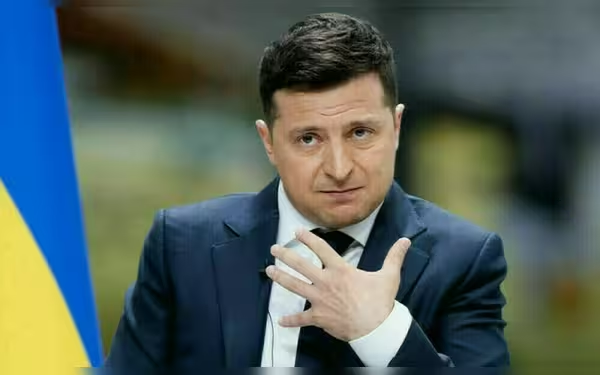Saturday, November 16, 2024 05:44 PM
Zelenskiy Unveils Victory Plan at Ramstein Meeting
- Zelenskiy to present victory plan to NATO allies.
- Ukraine faces challenges amid ongoing conflict with Russia.
- International support crucial for Ukraine's defense strategy.
 Image Credits: brecorder
Image Credits: brecorderZelenskiy to present Ukraine's victory plan at Ramstein meeting, seeking international support amid ongoing conflict with Russia.
In a significant development in the ongoing conflict between Ukraine and Russia, President Volodymyr Zelenskiy has announced that Ukraine will present its "victory plan" to its allies during a meeting in Germany next weekend. This meeting, scheduled for October 12 at the US Ramstein Air Base, will bring together key NATO members and other allies, including US President Joe Biden. The presentation of this plan marks a crucial moment for Ukraine as it seeks to solidify international support for its strategy to end the war that has persisted for nearly 1,000 days.
Zelenskiy took to the Telegram messaging app to share his intentions, stating, "We will present the victory plan, clear, specific steps for a just end to the war." This declaration comes on the heels of a significant setback for Ukraine, as Russian forces recently captured the eastern town of Vuhledar after two years of fierce resistance. The ongoing conflict has seen Ukraine fend off a much larger neighbor, and the stakes have never been higher.
During his nightly video address, Zelenskiy emphasized the importance of the upcoming Ramstein meeting, asserting that his government, military, and diplomatic officials will do "everything" possible to ensure that the discussions yield positive outcomes for Ukraine's defense and its vision for peace. Last week, he shared the plan with Biden, Vice President Kamala Harris, and former President Donald Trump, after months of hinting at potential solutions to the war.
The White House has acknowledged that Zelenskiy’s plan includes "a number of productive steps." However, a US official has characterized it as a repackaged request for additional weapons and a lifting of restrictions on long-range missile usage. The plan fundamentally aims for the ultimate defeat of Russia, a goal that some officials consider unrealistic.
Adding to the complexity of the situation, a report from the Financial Times suggested that Ukraine might need to cede land to Russia in exchange for NATO membership, a notion that has sparked considerable debate. Nevertheless, a source within Zelenskiy’s office dismissed this idea, stating that Kyiv does not "trade sovereignty and territories," labeling the report as "simply chatter." This highlights the delicate balance Ukraine must maintain as it navigates international relations while striving to protect its territorial integrity.
In June, Russian President Vladimir Putin made it clear that Moscow would only consider ending the war if Ukraine agreed to relinquish control of four regions claimed by Russia and abandon its NATO aspirations. This stance underscores the challenges that lie ahead for Ukraine as it seeks to forge a path toward peace.
As the Ramstein meeting approaches, the world watches closely. The outcome of this gathering could significantly influence the trajectory of the conflict and the future of Ukraine. It is a pivotal moment not just for Ukraine, but for global security and the principles of sovereignty and self-determination. The international community must remain engaged and supportive, as the stakes are high and the implications of this conflict extend far beyond the borders of Ukraine.













